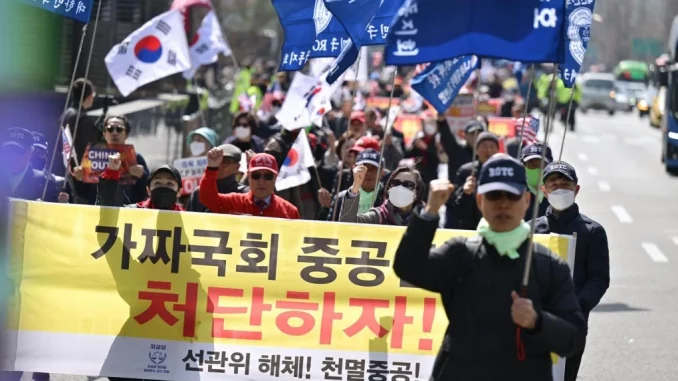
Published September 20, 2025
For more than three months, the bustling streets of Myeongdong, one of Seoul’s busiest shopping districts, have become the stage for a wave of anti-China protests. Demonstrators waving banners emblazoned with “China Out” and “Hate China” slogans have drawn both attention and controversy, particularly because the gatherings take place near the Chinese embassy.
While some South Koreans see the protests as a legitimate expression of anger toward Beijing’s policies, others—including local merchants—say the rallies have gone too far, scaring off Chinese tourists and disrupting daily business. “The noise is constant, and sales are down. Tourists don’t feel welcome,” one shop owner told local media.
The government has now stepped in. Prime Minister Kim Min-seok recently ordered law enforcement to take “strong action” to restore order and ensure safety in Myeongdong. Authorities are expected to increase monitoring, citing the need to protect residents, businesses, and Chinese nationals who say they feel targeted by harassment.
The move comes at a sensitive time. Seoul has been trying to repair strained ties with Beijing after years of tension over trade, security, and North Korea. Officials worry that unchecked street demonstrations could overshadow diplomatic overtures and reinforce negative perceptions of South Korea inside China.
Yet the decision is not without risk. Critics warn that cracking down on protests could stifle freedom of expression in a country that prides itself on its vibrant democracy. Human rights advocates argue that suppressing dissent to appease Beijing could inflame public opinion and fuel deeper resentment toward China.
The episode underscores Seoul’s broader challenge: balancing its identity as a democratic society with the realities of geopolitics. China remains South Korea’s largest trading partner and a critical player in managing the North Korean issue. At the same time, South Korean public opinion has grown increasingly wary of Beijing’s influence, making the government’s tightrope act even more precarious.
 Implications of South Korea vowing “strong action” against the anti-China protests:
Implications of South Korea vowing “strong action” against the anti-China protests:
1. Diplomatic Relations
-
Positive for Seoul-Beijing ties: By curbing the protests, South Korea signals goodwill to China, showing it wants to stabilize relations and avoid tensions.
-
Risk of dependence: Over-accommodation might make Seoul appear too responsive to Chinese pressure, possibly raising concerns in Washington or Tokyo about where Seoul stands in the regional balance.
2. Domestic Politics & Civil Liberties
-
Freedom of expression concerns: Cracking down on demonstrations could trigger backlash from civil rights groups and opposition politicians, who may accuse the government of stifling dissent.
-
Political polarization: The issue could deepen divides between pro-engagement voices (who want smoother ties with China) and nationalist or conservative groups critical of Beijing.
3. Economic Impacts
-
Tourism protection: Reducing harassment of Chinese visitors could help revive Chinese tourism in Seoul, benefiting businesses in Myeongdong and beyond.
-
Trade signaling: South Korea’s firm stance might reassure Beijing and encourage smoother trade or investment flows, especially given China’s role as a top trading partner.
4. Public Opinion & National Sentiment
-
Anti-China feeling may grow: Efforts to suppress protests could fuel resentment among South Koreans who already distrust or dislike China, creating a “martyr effect” for the protesters.
-
Image management: The government’s handling will affect how the public perceives it—either as protecting order and diplomacy, or as bending to Beijing.
5. Regional & Strategic Balance
-
Geopolitical tightrope: South Korea is caught between its U.S. alliance (which encourages resistance to Chinese influence) and its need for stable China ties (trade, North Korea issue). Handling the protests carefully is essential to avoid sending the wrong signal to either side.
-
North Korea factor: Since China plays a role in restraining Pyongyang, Seoul may see managing anti-China protests as essential for broader security stability.
 Overall Takeaway:
Overall Takeaway:
South Korea’s vow to take “strong action” against anti-China protests highlights the delicate balance Seoul must strike between protecting democratic freedoms at home and maintaining stable relations with Beijing abroad. On one hand, curbing disruptive demonstrations reassures merchants, safeguards tourism, and signals to China that Seoul is serious about resetting ties. On the other hand, excessive restrictions could spark domestic backlash, deepen anti-China sentiment, and raise concerns about government overreach.
Ultimately, this move reflects South Korea’s broader strategic dilemma: it cannot afford to alienate China, a key economic partner and regional power, yet it must also preserve its democratic values and public trust. How the government manages this tension will shape not only its diplomatic standing with Beijing, but also its credibility at home and in the wider international community.
SOURCES: SOUTH CHINA MORNING POST – South Korea vows ‘strong action’ against anti-China protests amid efforts to reset ties





Be the first to comment